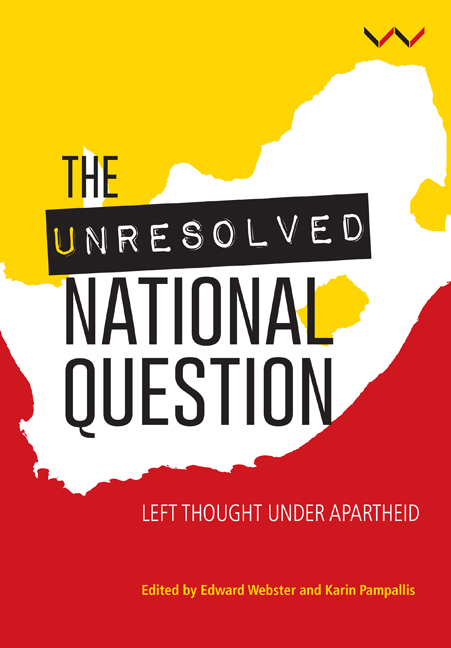Book contents
- Frontmatter
- Contents
- Acronyms and Abbreviations
- Preface: Edward Webster and Karin Pampallis
- Introduction: Revisiting the National Question
- PART ONE KEY FOUNDATIONAL TRADITIONS
- Chapter 1 Decentring the Question of Race: Critical Reflections on Colonialism of a Special Type
- Chapter 2 The African National Congress: Social Democratic Thinking and the Good Society, 1940–1962
- Chapter 3 Oliver Tambo and the National Question
- Chapter 4 The Unity Movement and the National Question
- Chapter 5 The Africanist Turn in South African National Question Discourses
- PART TWO CONTINUITY AND RUPTURE
- Biographical Notes
- Index
Chapter 2 - The African National Congress: Social Democratic Thinking and the Good Society, 1940–1962
from PART ONE - KEY FOUNDATIONAL TRADITIONS
Published online by Cambridge University Press: 21 April 2018
- Frontmatter
- Contents
- Acronyms and Abbreviations
- Preface: Edward Webster and Karin Pampallis
- Introduction: Revisiting the National Question
- PART ONE KEY FOUNDATIONAL TRADITIONS
- Chapter 1 Decentring the Question of Race: Critical Reflections on Colonialism of a Special Type
- Chapter 2 The African National Congress: Social Democratic Thinking and the Good Society, 1940–1962
- Chapter 3 Oliver Tambo and the National Question
- Chapter 4 The Unity Movement and the National Question
- Chapter 5 The Africanist Turn in South African National Question Discourses
- PART TWO CONTINUITY AND RUPTURE
- Biographical Notes
- Index
Summary
This chapter will build on previous research on the African National Congress (ANC) and the National Question rather than restate it (Suttner and Cronin, 1986; Van Diepen, 1988). It will focus on public goods and the idea of the ‘good society’ embedded in two foundational policy documents of the ANC: African Claims of 1943 and the Freedom Charter of 1955. It will discuss the thinking that informed these documents in the context of the struggle to overcome the racial and class inequalities of the apartheid era.
I chose this approach because I consider that the framing of the National Question is not reducible only to the struggle to end white domination. It is also about the idea of an alternative ‘good society’ – that is, a society planned and organised with particular social and economic arrangements to meet the needs of its citizens. The ANC, in the struggle to construct a nation, had defined an understanding of what the ‘good society’ was; this is reflected most significantly in African Claims and the Freedom Charter. These ANC policy documents are embedded in the idea that the state should actively intervene in the market to secure the social rights of citizenship for all citizens – which included rights to healthcare in the form of a national health service (NHS), the rights to education in the form of a comprehensive system of education, and rights to welfare in the form of a national system of welfare provision. These historical policy statements also directly imply or call for economic arrangements that are consistent with a neo-Keynesian social democratic strategy of economic development, where the state intervenes to secure decent employment for its citizens, including through investment in public goods such as health and education which are universally free at the point of delivery. They articulate a clear ‘strategy of equality’ for the society which the socialist and historian Richard Tawney described as
… the pooling of its surplus resources by means of taxation, and the use of the funds thus obtained to make accessible to all, irrespective of their income, occupation, or social position, the conditions of civilization which, in the absence of such measures, can be enjoyed only by the rich (Tawney, 1952: 130).
- Type
- Chapter
- Information
- The Unresolved National Question in South AfricaLeft Thought Under Apartheid, pp. 42 - 59Publisher: Wits University PressPrint publication year: 2017



